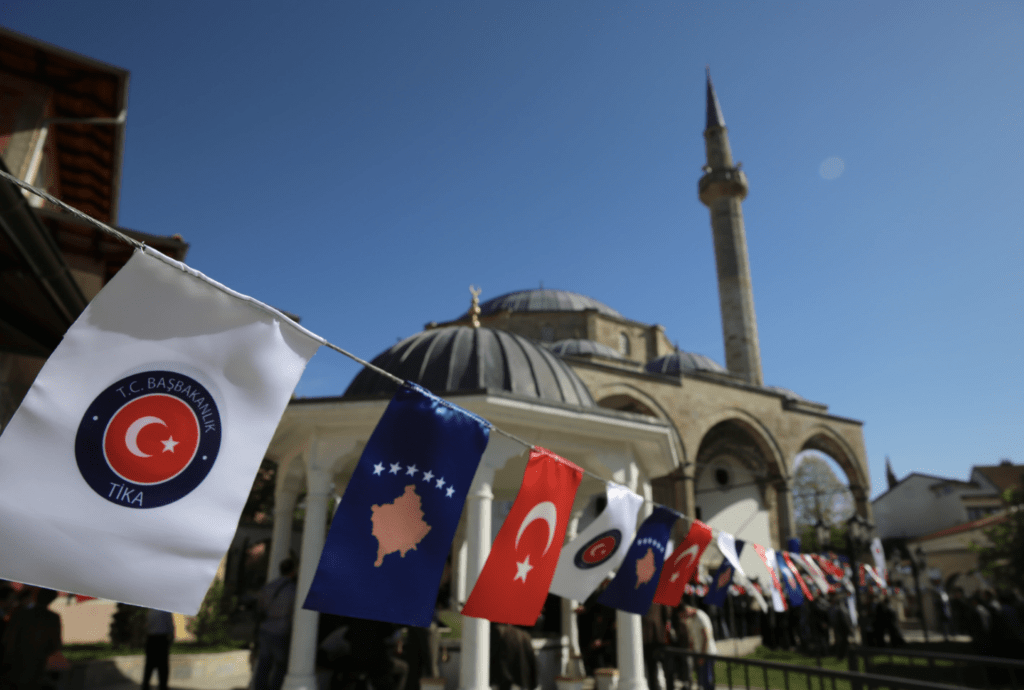“Unutmayın, Türkiye Kosova’dır, Kosova Türkiye’dir” (Türkiye is Kosovo, Kosovo is Türkiye): these were the words pronounced by Recep Tayyip Erdoğan, then Türkiye’s Prime Minister, at the time when he came to the second largest city of Kosovo, Prizren, in 2013. The statement has been criticized by actors, mostly outside of the Balkan Peninsula, as damaging to foreign policy, but also as a claim that goes beyond the sphere of nationalism. Indeed, the now Turkish President is enacting serious cultural diplomacy in the Balkans with a variety of politico-cultural tools which simultaneously represent the political party in power, the AK Party (Adalet ve Kalkınma Partisi), and at the same time, the “Turkishness” or Ottoman legacy – from Skopje to Budapest.
This attempt to bring “Outer Turks” and Türkiye closer is backed by the dimension of Islam: the Turkish government is helping Balkan, African and Asian Muslims, but even non-Muslims to a lesser extent, with its humanitarian instrument: TİKA. Indeed, the Turkish Cooperation and Coordination Agency (Türk İşbirliği ve Koordinasyon Ajansı Başkanlığı) was created in 1992 to maintain close ties with the freshly new Turkic Central Asian States (Kazakhstan, Kyrgyzstan, Tajikistan, Uzbekistan) and Azerbaijan. The agency belongs under the Ministry of Culture and Tourism. The current Turkish Minister of Foreign Affairs, Hakan Fidan, had served as TİKA president between 2003 and 2007. His successor at the head of TİKA became ambassador to Mauritania, and the successor of the latter, Serdar Çam, is now Deputy Minister of Culture and Tourism. Additionally, two other public entities play a strong role in promoting Turkish language and culture – the Yunus Emre Enstitüsü, created in 2007 by the Turkish government, and the Diyanet, the Directorate of Religious Affairs, closely working with the AKP government.
As we can see, the borders between culture, politics and diplomacy intertwine to define Turkish foreign policy: driven by a fondness for Turkish and Muslim minorities in the former Ottoman lands, and to a lesser extent, to whole countries, from South Africa to Moldova or Comoros. The position in which Ankara is putting itself through soft power has been described as kin-state by Esra Bulut, describing “the populations in the region with whom Turkey is envisaged to have a special relationship”.
In Kosovo, Türkiye is acting as a strong ally for Prishtina since the 1999 war after which it was one of the first countries to recognize Kosovo’s independence. In this respect, Mehmetçik (the nickname for the Turkish soldiers) are strongly committed to the KFOR (NATO mission in Kosovo). Among the more than 4,500 NATO soldiers, Türkiye is the fourth largest contributor to this international force – with 352 Mehmetçik – after Italy, the United States and Hungary. Moreover, while the Turkish Major General Özkan Ulutaş was appointed as KFOR Commander in October 2023, his soldiers are also leading educational projects in schools all over Kosovo.
Turkish soft power in Kosovo is mainly addressed to the “Outer Turks” – the 19,000 Kosovar Turks who are mostly living in the Prizren and Prishtina areas. Ankara is an attractive partner for the majority of the youth of this minority which often goes to Türkiye for studies and even holds dual citizenship. Within the Prishtina administration, the Turkish minority is allowed representation in the national parliament with two deputies (Fidan Jilta and Enis Kervan) and a Turkish representative, Fikrim Damka, who is currently serving as Minister of Regional Development, but also President of the KDTP (Kosova Demokratik Türk Partisi).
However, despite those quotas, the Kosovar Turks have been divided between three political parties: KDTP, KTB (Kosova Türk Birliǧi), and KATP (Kosova Adalet Türk Partisi), even though the most active and famous one is the KDTP, which also has close ties with the AK Party. Within this environment, the Municipality of Mamusha/Mamuşa is playing the role of spearhead for Turkish foreign policy in Kosovo. This village of 5,000 people is 95% ethnically Turk and is located in the Prizren region. In the village, Turkish is used and taught more largely than in Prizren, and high-ranked “Inner Turks” such as ministers often pay visits to the Anadolu (Anatolia) school, or even for Ramadan, alongside the Mehmetçik stationed there.
In sum, the Turks of Kosovo are limited by national quotas, driven by feelings of “Turkishness”, but also by nostalgia since Turkish writings were present in the national institutions and in the administration during the Tito Yugoslav times (1953-1980). The third largest minority of Kosovo (after Serbs and Bosniaks) are central for the Ankara administration through TİKA, the Diyanet and other soft power tools. The question remains whether Turkish support to Prishtina will remain so strong, especially considering the upcoming vote in the Council of Europe for the process of Kosovo membership, the recent threats from the Serbian President Aleksandar Vučić about an invasion at the right time, EU membership candidacy of Kosovo, and the wars in the EU’s Neighbourhood. Between critics of Neo-Ottomanism, the pursuance of Turkish foreign policy seen from Ankara as part of the logical and spiritual link to the Balkans, to what extent can its controversial soft power stay unchanged in the new geopolitical order over the next decades?
Photo source: https://tika.gov.tr/detail-kosovada_fatih_cami_cevre_duzenlemesinin_acilisi_gerceklestirildi/

